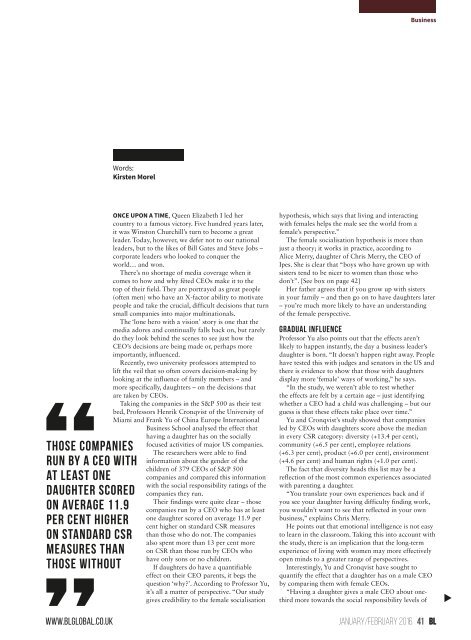BL Magazine
Create successful ePaper yourself
Turn your PDF publications into a flip-book with our unique Google optimized e-Paper software.
Business<br />
Words:<br />
Kirsten Morel<br />
Those companies<br />
run by a CEO with<br />
at least one<br />
daughter scored<br />
on average 11.9<br />
per cent higher<br />
on standard CSR<br />
measures than<br />
those without<br />
ONCE UPON A TIME, Queen Elizabeth I led her<br />
country to a famous victory. Five hundred years later,<br />
it was Winston Churchill’s turn to become a great<br />
leader. Today, however, we defer not to our national<br />
leaders, but to the likes of Bill Gates and Steve Jobs –<br />
corporate leaders who looked to conquer the<br />
world… and won.<br />
There’s no shortage of media coverage when it<br />
comes to how and why fêted CEOs make it to the<br />
top of their field. They are portrayed as great people<br />
(often men) who have an X-factor ability to motivate<br />
people and take the crucial, difficult decisions that turn<br />
small companies into major multinationals.<br />
The ‘lone hero with a vision’ story is one that the<br />
media adores and continually falls back on, but rarely<br />
do they look behind the scenes to see just how the<br />
CEO’s decisions are being made or, perhaps more<br />
importantly, influenced.<br />
Recently, two university professors attempted to<br />
lift the veil that so often covers decision-making by<br />
looking at the influence of family members – and<br />
more specifically, daughters – on the decisions that<br />
are taken by CEOs.<br />
Taking the companies in the S&P 500 as their test<br />
bed, Professors Henrik Cronqvist of the University of<br />
Miami and Frank Yu of China Europe International<br />
Business School analysed the effect that<br />
having a daughter has on the socially<br />
focused activities of major US companies.<br />
The researchers were able to find<br />
information about the gender of the<br />
children of 379 CEOs of S&P 500<br />
companies and compared this information<br />
with the social responsibility ratings of the<br />
companies they run.<br />
Their findings were quite clear – those<br />
companies run by a CEO who has at least<br />
one daughter scored on average 11.9 per<br />
cent higher on standard CSR measures<br />
than those who do not. The companies<br />
also spent more than 13 per cent more<br />
on CSR than those run by CEOs who<br />
have only sons or no children.<br />
If daughters do have a quantifiable<br />
effect on their CEO parents, it begs the<br />
question ‘why?’. According to Professor Yu,<br />
it’s all a matter of perspective. “Our study<br />
gives credibility to the female socialisation<br />
hypothesis, which says that living and interacting<br />
with females helps the male see the world from a<br />
female’s perspective.”<br />
The female socialisation hypothesis is more than<br />
just a theory; it works in practice, according to<br />
Alice Merry, daughter of Chris Merry, the CEO of<br />
Ipes. She is clear that “boys who have grown up with<br />
sisters tend to be nicer to women than those who<br />
don’t”. [See box on page 42]<br />
Her father agrees that if you grow up with sisters<br />
in your family – and then go on to have daughters later<br />
– you’re much more likely to have an understanding<br />
of the female perspective.<br />
GRADUAL INFLUENCE<br />
Professor Yu also points out that the effects aren’t<br />
likely to happen instantly, the day a business leader’s<br />
daughter is born. “It doesn’t happen right away. People<br />
have tested this with judges and senators in the US and<br />
there is evidence to show that those with daughters<br />
display more ‘female’ ways of working,” he says.<br />
“In the study, we weren’t able to test whether<br />
the effects are felt by a certain age – just identifying<br />
whether a CEO had a child was challenging – but our<br />
guess is that these effects take place over time.”<br />
Yu and Cronqvist’s study showed that companies<br />
led by CEOs with daughters score above the median<br />
in every CSR category: diversity (+13.4 per cent),<br />
community (+6.5 per cent), employee relations<br />
(+6.3 per cent), product (+6.0 per cent), environment<br />
(+4.6 per cent) and human rights (+1.0 per cent).<br />
The fact that diversity heads this list may be a<br />
reflection of the most common experiences associated<br />
with parenting a daughter.<br />
“You translate your own experiences back and if<br />
you see your daughter having difficulty finding work,<br />
you wouldn’t want to see that reflected in your own<br />
business,” explains Chris Merry.<br />
He points out that emotional intelligence is not easy<br />
to learn in the classroom. Taking this into account with<br />
the study, there is an implication that the long-term<br />
experience of living with women may more effectively<br />
open minds to a greater range of perspectives.<br />
Interestingly, Yu and Cronqvist have sought to<br />
quantify the effect that a daughter has on a male CEO<br />
by comparing them with female CEOs.<br />
“Having a daughter gives a male CEO about onethird<br />
more towards the social responsibility levels of<br />
▼<br />
www.blglobal.co.uk january/february 2016 41

















